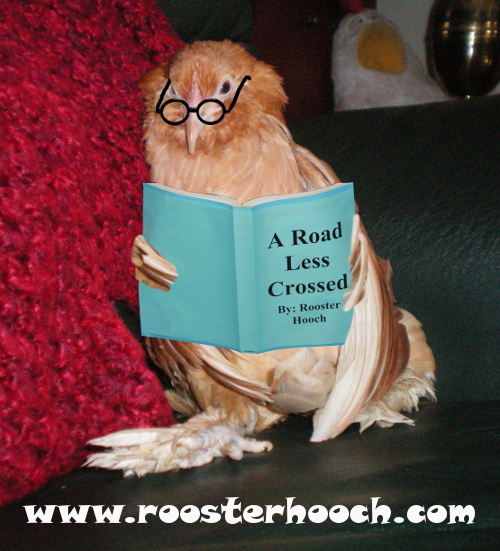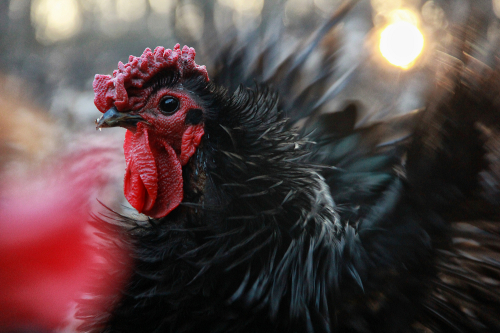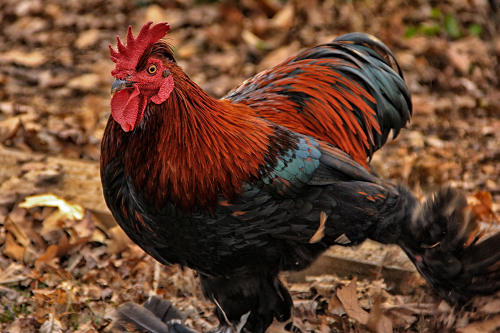Do You Keep a Flock Journal?
 I think we can all recall at least one time in the history of our pet ownership when we realize that there is something amiss. They don’t act right, don’t look right, or have something more concrete like breathing or eating problems. We know we are in over our heads and a warm cuddle on the couch isn’t going to cure what ails them. We feel powerless to help them and we know that we need someone with more knowledge to assess and help our little friend. So, we gather then up and take them to the professional. But what are we asking of this professional? We are asking them to look at our pet, an animal that most likely they have absolutely no history of, and try to make a diagnosis that in many cases can be the line between life and death. Is there a way that we can help that professional do their job more efficiently and at the same time not feel so powerless?
I think we can all recall at least one time in the history of our pet ownership when we realize that there is something amiss. They don’t act right, don’t look right, or have something more concrete like breathing or eating problems. We know we are in over our heads and a warm cuddle on the couch isn’t going to cure what ails them. We feel powerless to help them and we know that we need someone with more knowledge to assess and help our little friend. So, we gather then up and take them to the professional. But what are we asking of this professional? We are asking them to look at our pet, an animal that most likely they have absolutely no history of, and try to make a diagnosis that in many cases can be the line between life and death. Is there a way that we can help that professional do their job more efficiently and at the same time not feel so powerless?
As Always, on my most recent visit to the Vet, I had my Flock Journal tucked under my arm. This was our first time at this practice so they did not have any of our records, but it wouldn’t have mattered as this was Finch’s first visit to any Vet. She was a tiny Serama Chicken and she wasn’t even a year old. Before we even saw the Doctor, the technician took a brief history and recorded Finch’s weight. Then we waited patiently for the Doctor.
When the Vet came into the little white room we were waiting in, she greeted us pleasantly and then took a quiet minute to review the notes the technician had made. Then she gently took little Finch from me and proceeded with the routine of checking sounds and feels. She was searching for notable abnormalities. The Doctor then said to me, “She seems a little thin, do you think she has lost weight.” That could easily have been a moment when I dumbstruck said, “Uh, I don’t know.” And in fact, I didn’t know the answer to that question, but I knew exactly where to find the information. I pulled my little book out and started flipping through the war worn pages. I reported to her that “on September 19 of this year she weighed 13.5 oz, on July 2 of this year she weighed 12 oz, and on December 19 of last year she weighed 7 oz, but she was only 3 months old at that point, so she had not reached her mature weight.” I was able to say with authority, “So according to my records, no, she hasn’t.” The Vet seemed suitably impressed that I had kept these records for my little pet chicken, but the fact is, I keep records for all of my flock, whether they are a pet or one of the many yard birds that provide us with so many hours of amusement.
So, what records should you be keeping?
I suggest a spiral bound notebook, mine is 9.5 x 6 inches. I like that size because it provides me a good area for taking notes, making lists, or taping this or that piece of relevant information inside one of the pages. It is also important to have a scale that will give you an accurate weight measurement on all of your birds. For years all I had was an old spring style kitchen scale. It only went up to 5 lb, but most of our birds are bantams so it was sufficient. Recently, we purchased a digital baby scale that goes up to 44lbs so we could also keep accurate weight measurements on our turkeys and peacocks as well.
So then what? The main thing that my little journal contains is a bi-annual weight record of all the birds. It is recorded in the spring and in the fall. It allows me to keep track of dramatic fluctuations in weight which might be your first indication that there is a problem, even before they start exhibiting any other symptoms. I can’t tell you how many times I have had someone call me for advice on an ailing bird; They say that their bird was acting unusual and when they picked them up they were shocked to find that they were completely emaciated, but that it had been hidden by the feathers. That is not to say that this can’t happen to the most fastidious of us. Sometimes a bird will go down hill so quickly that by the time you catch it, it’s too late. I am still occasionally caught off guard by something in my flock, but keeping accurate records can be your first line of defense. So what if you don’t name all of your birds or can’t identify them by color pattern or breed? Then you might consider leg banding them as an alternate form of identification.
The weight records serve a second purpose. Because it is so vitally important to get the dosages correct when worming with Ivermectin, this will give you the weight reading necessary for accurate dosing. Our flock doesn’t necessarily get wormed every time they are weighed, but they are always weighed when they are wormed. I never rely on old readings and I never guess-timate
The next thing my book contains is a record of when the coop was cleaned. Because coops should be cleaned regularly, and not just on an as needed basis, I keep track of the cleaning dates. My cleaning schedule varies depending on the time of the year, because the birds spend more time in the shelter of their barn in the winter and more time out in the large covered run in the summer. Cleaning schedules are also adapted for the number of birds that are in the area at any one time. So whatever you schedule is, keep track of it because it can easily slip your mind when you get busy.
Next, I keep a record of all vet visits. This includes the date of the visit, vitals on the bird and any medications that are prescribed and the instructions that go along with them. For instance, one vet instructed me to make sure that Baytril is diluted before it’s given orally. Not because it changed the dosage, just that it was such a strong medication. Once I draw the dosage, I should then draw some water into the syringe so that it doesn’t irritate the inside of the mouth. I also make note of what the medications are used for. For instance, Regulan or Metaclopromide is for speeding up digestion, Trimeth Sulfa in a common antibiotic used for birds and Nystatin is an anti-fungal. I also keep a daily record of how I administered the medications and anything I observed until the next visit or the passing of the bird which ever came first. Unfortunately you can’t save them all.
Your observations can be crucial in helping the Vet figure out what is wrong if the first medications don’t do the trick. After I have finished a medication, or disposed of it because it was too old to use safely, I carefully peel the Rx label off the packaging and stick it in my book. That way, if I have a similar problem with a different bird in the future, I can tell the Vet exactly what was prescribed, what the dosages were and whether or not it worked. It can possibly save valuable time in making an accurate diagnosis. Additionally, the Rx labels always have the name of the Vet and the practice on the label. In case I can’t remember a name or phone number, I don’t have to search the internet or look for that refrigerator magnet. I grab my book and make the call.
I don’t use the same veterinarians for all of my birds, so having this reference has saved me a lot of time. It isn’t as crucial if you always use the same vet. But if you always go to the same practice and they are not an emergency facility, then having the name and number of a 24 hour emergency vet in your book can save you valuable time.
I keep a record of dates for procedures for birds that have liver problems and need to have their abdomens drained on a regular basis. I keep the packages and informational inserts from all of the medications that come in their original packaging instead of a prescription bottle. I keep the packaging from any needles that I purchase for use with the birds so I don’t make a stupid “ummm” noise when someone asks me what gauge needle I need. And last but certainly not least, I keep records of all special instructions for medications. For example, shake well before using, refrigerate, do not freeze, and protect form light.
What about over the counter medications? Have you ever used Corid on your flock? How did you administer it and in what doses? If you did the complex math to figure out how much should be given by weight, then I bet if you don’t want to have to do those calculations again. So, write it in your journal. How about any natural or herbal remedies that there might be for chickens? There are two good reasons to keep this information. First, if you try something you may have read online and it works, you will want to know what you did for the next time. Second, if it doesn’t work or your bird has an unexpected reaction, you will be able to tell your Vet exactly what you did.
I also keep a general record of what kind of feed I’m using. Not every time I buy a sack of it, but the name of the brand and formulation. Then if I switch feeds, I note that and when the changeover occurred. I can count on one hand the number of people that have told me a story of a feed contamination scare where they see a news report. They can’t remember if that was the feed they were using or not, because they dump their feed into a large bin and discard the bags. It doesn’t happen often, but it can be terrifying when it does. So keep track, better safe than sorry.
Where did you get your birds from? Which birds were hatchery birds that you can verify were immunized? Did they come right from the hatchery in a shipping box? If so, when did they arrive? If you purchased them from a local feed store, question the store as to where they got their stock. If they came from a breeder, record the name and information for the breeder. If you hatched them at home, record the hatch dates and successfulness of the hatch. For example, how many eggs hatched out of how many you put in the incubator. It can be a window into genetic or contagion born problems later. Or, it can simply tell you that some component of you incubator needs adjusted or replaced. If you only hatch once a year, how many of us can remember the hatch rate from year to year?
What else? How many times have you read an interesting article on chicken health and thought about something in it weeks later. Yet, you were unable to locate the article again to check a fact that you thought you remembered? Print it out and paste it in your book. It’s not easy to relocate an article out of your favorite poultry magazine when you have 3 years worth of copies on the bookcase, so cut it out and put it in the book. If you don’t want to cut up your magazines, make a photocopy first.
Also, consider writing down any cute stories about your birds and how they interact with each other, other animals or people. You never know when a book might be in your future…


